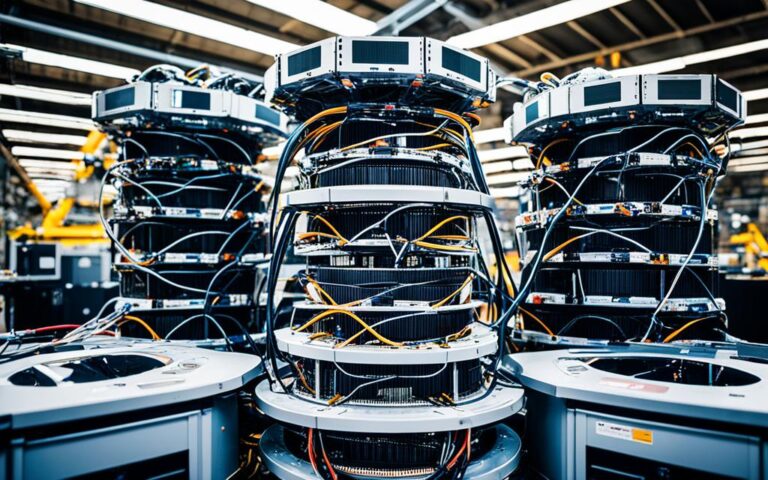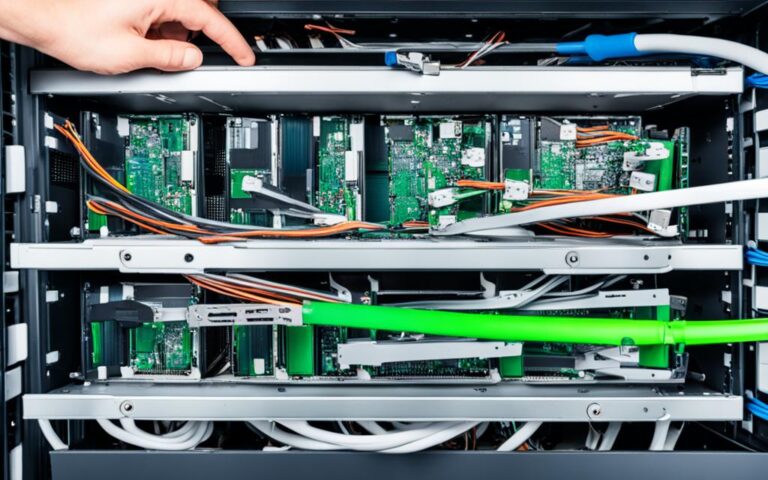Partnering with Server Recycling Services: What to Look For
In today’s digital age, responsible disposal of servers is of utmost importance for businesses. Not only does it help mitigate environmental impact, but it also ensures data security. When it comes to server recycling services, choosing the right partner is crucial. But what should you look for in a server recycling service? Here are some key factors to consider.
Environmental Sustainability: Look for a server recycling service that prioritizes environmental sustainability. Make sure they have proper certifications and adhere to best practices in recycling and waste management. By partnering with an environmentally responsible service, you can minimize your carbon footprint and contribute to a greener future.
Secure Data Destruction: Data security is paramount when disposing of servers. Ensure that the recycling service you choose offers secure data destruction services. Properly wiping and destroying sensitive information prevents unauthorized access and protects your business from potential data breaches.
Regulatory Compliance: Server recycling involves handling hazardous materials and complying with environmental regulations. Verify that the service provider follows all relevant regulations and maintains proper documentation. This not only ensures legal compliance but also demonstrates their commitment to responsible recycling practices.
By considering these factors, you can find a reputable server recycling service that aligns with your environmental goals, data security requirements, and regulatory obligations. Partnering with the right service provider will not only help you dispose of servers responsibly but also optimize your IT asset disposition practices.
The Environmental Impact of Decommissioned Servers
Decommissioned servers can have a significant environmental impact if not recycled properly. These servers contain hazardous materials like lead, mercury, and cadmium that can leach into the soil and water if not disposed of responsibly. E-waste from servers contributes to pollution and poses a risk to ecosystems and human health. Recycling servers helps prevent these harmful effects by reducing e-waste, recovering valuable metals, and promoting a more sustainable production cycle.
When servers are decommissioned, they often contain toxic substances that can harm the environment if left unattended. These hazardous materials can contaminate the soil, pollute water sources, and pose a risk to wildlife and human populations. By disposing of servers in an environmentally responsible manner, businesses can prevent the release of these harmful substances and protect the planet.
Server recycling plays a crucial role in reducing electronic waste, or e-waste, which is a growing problem worldwide. According to the Global E-waste Monitor, over 53 million metric tons of e-waste were generated in 2019 alone, and this number is expected to increase. Decommissioned servers contribute to this growing issue, but by recycling them, businesses can help reduce the amount of e-waste that ends up in landfills or is illegally exported to developing countries.
Not only does server recycling prevent pollution and reduce e-waste, but it also allows for the recovery of valuable metals and other resources. Servers contain components made from precious materials such as gold, silver, and copper. By recycling these servers, these valuable resources can be extracted and reused in the production of new electronic devices, reducing the need for virgin resources and minimizing the environmental impact of mining.
The Environmental Benefits of Server Recycling
Server recycling offers a range of environmental benefits, including:
- Reduced carbon emissions: Recycling servers reduces the energy and emissions associated with the manufacturing of new servers, resulting in a smaller carbon footprint.
- Conservation of resources: Recovering materials from decommissioned servers reduces the demand for new resources, preserving natural reserves and minimizing the need for resource-intensive extraction processes.
- Promotion of sustainability: By recycling servers, businesses contribute to a more circular economy, where materials are reused and recycled, reducing waste and promoting sustainable production practices.
Server Recycling in Action
To illustrate the environmental impact of server recycling, consider the following data:
| Environmental Impact | Without Server Recycling | With Server Recycling |
|---|---|---|
| E-Waste Generation | Increases landfill waste and illegal e-waste export | Reduces e-waste by recovering and recycling materials |
| Carbon Emissions | High due to energy-intensive manufacturing processes | Lowered by reusing and recycling server components |
| Resource Conservation | Higher demand for virgin resources | Reduces the need for resource extraction |
By implementing server recycling practices, businesses can make a tangible, positive impact on the environment, reducing waste, conserving resources, and mitigating the effects of climate change.
“Server recycling is not just about getting rid of old equipment; it’s about making a conscious choice to protect the environment and promote sustainability. By recycling decommissioned servers, we can prevent pollution, reduce waste, and create a more sustainable future for generations to come.” – Sustainability Expert
The Benefits of Server Recycling
Server recycling offers numerous benefits, both environmentally and economically. By choosing to recycle servers, businesses can make a positive impact on the planet while also optimizing their bottom line.
“Recycling servers helps reduce e-waste, conserve resources, and lower carbon emissions.”
When servers are recycled, they no longer contribute to the growing e-waste problem. Instead, valuable components and materials can be recovered and reused, extending their lifecycle and reducing the need for raw materials extraction.
Environmental Benefits
Server recycling helps to:
- Reduce e-waste
- Conserve valuable resources
- Lower carbon emissions
Economic Benefits
Server recycling can also generate revenue through:
- The resale of refurbished parts
- The extraction and sale of valuable metals
By turning old servers into profitable assets, businesses can recoup some of their initial investments and redirect funds towards more strategic initiatives.
Data Security Benefits
Proper data destruction is crucial for data security. When recycling servers, a reputable service provider ensures that all sensitive information is securely destroyed, minimizing the risk of data breaches or unauthorized access.
Choosing a reputable server recycling service is essential to fully reap the benefits of server recycling. Not only does it contribute to a greener future and enhance a business’s reputation, but it also aligns with the growing societal demand for sustainable practices.
Consider the following image that illustrates the benefits of server recycling:
| Benefits of Server Recycling | |
|---|---|
| Environmental Benefits | Economic Benefits |
| – Reduces e-waste | – Resale of refurbished parts |
| – Conserves resources | – Extraction of valuable metals |
| – Lowers carbon emissions | |
| Data Security Benefits | |
| – Proper data destruction |
The Process of Server Recycling
In order to responsibly recycle servers, a systematic approach is followed, ensuring proper planning, sorting, disassembly, and documentation throughout the process. By adhering to these steps, server recycling providers can effectively manage the disposal of decommissioned servers, promote environmental sustainability, and comply with relevant regulations.
Planning and Assessing Project Requirements
Before initiating the server recycling process, it is essential to develop a comprehensive plan and evaluate the specific requirements of the project. This includes determining the quantity of servers to be recycled, identifying any data security considerations, and assessing the environmental impact of the disposal.
Sorting and Disassembling Servers
Once the planning phase is complete, the servers are sorted based on their condition and functionality. This step involves identifying any reusable components that can be refurbished or resold. By salvaging these parts, server recycling providers can reduce waste and contribute to the circular economy.
After sorting, the servers are carefully disassembled, separating their various components. This allows for a more efficient and targeted recycling process, ensuring that each part is handled appropriately.
Separating and Processing Components
Non-reusable components, such as plastic casings and outdated technology, are separated by material type. This enables proper processing and disposal in accordance with environmental regulations. The focus of the recycling process is on the recovery of valuable metals, such as copper and gold, which can be extracted and reused in other industries.
Documentation and Compliance
Throughout the entire server recycling process, detailed documentation is maintained to track the handling and disposal of each server. This ensures compliance with environmental regulations and provides transparency in the disposal chain. By maintaining these records, businesses can demonstrate their commitment to responsible server recycling and mitigate any potential legal or reputational risks.
| Step | Description |
|---|---|
| 1 | Planning and Assessing Project Requirements |
| 2 | Sorting and Disassembling Servers |
| 3 | Separating and Processing Components |
| 4 | Documentation and Compliance |
By following this comprehensive process, businesses can ensure that their servers are recycled responsibly, minimizing their ecological impact and promoting a more sustainable IT ecosystem.
The Risks of Improper Server Disposal
Improper disposal of servers poses significant risks to the environment and data security. Servers contain hazardous substances that can leach into the soil and water if not disposed of properly, contributing to pollution and ecosystem damage. Risks of improper server disposal include:
-
Environmental Pollution: When servers are inadequately disposed of, hazardous materials such as lead, mercury, and cadmium can contaminate the soil and water. This pollution can harm ecosystems, disrupt natural habitats, and even pose risks to human health.
-
Data Security Breaches: Improper server disposal exposes businesses to data security risks. Servers often contain sensitive information, including customer data, financial records, and confidential documents. Without proper destruction, this information can be accessed by unauthorized individuals and result in identity theft, financial fraud, or other serious breaches.
“Proper server disposal is essential for environmental responsibility and protecting sensitive information. By choosing a reputable server recycling service, businesses can mitigate these risks and ensure a secure and sustainable approach to server disposal.”
Choosing a reputable server recycling service is essential to minimize the risks associated with improper server disposal. These services ensure that servers are handled and disposed of safely, in compliance with environmental regulations and data protection laws. By partnering with a trusted provider, businesses can safeguard the environment, promote sustainability, and protect valuable data.
Now that we understand the risks of improper server disposal, let’s explore the process of server recycling in the next section.
Introduction to Server Recycling
Server recycling is a fundamental practice that allows businesses to repurpose, refurbish, or dispose of old, obsolete, or decommissioned servers in an environmentally responsible manner. By engaging in server recycling, businesses can greatly reduce their environmental impact, ensuring a more sustainable future.
One key aspect of server recycling is the protection of data security. It is crucial for businesses to properly handle and destroy sensitive information stored on servers to prevent any potential data breaches or unauthorized access. By partnering with a trusted server recycling service, businesses can address this critical concern while also complying with regulatory requirements.
Furthermore, server recycling enables businesses to optimize their IT investments. Instead of allowing servers to gather dust in storage or filling up landfills, recycling allows valuable components to be salvaged and reused. This not only reduces waste but also provides opportunities for cost savings and potential revenue generation through the resale of refurbished parts.
The process of server recycling involves breaking down servers into their component parts, such as processors, memory modules, and storage devices. These components can then be securely erased to ensure all data is permanently removed. The reusable components are refurbished for reuse, while non-reusable parts are sent for responsible recycling, promoting a circular economy.
By adopting server recycling practices, businesses can make a significant difference in minimizing their carbon footprint and contributing to a greener future. Let’s explore the benefits of server recycling in more detail.
“Server recycling helps businesses reduce their environmental impact, ensure data security, maintain regulatory compliance, and optimize their IT investments.”
Benefits of Server Recycling
Server recycling offers a wide range of benefits that go beyond environmental sustainability. By engaging in server recycling, businesses can:
- Minimize their carbon footprint by reducing electronic waste and promoting responsible disposal practices.
- Conserve valuable resources by recovering and reusing components instead of relying solely on raw materials.
- Lower energy consumption and carbon emissions associated with the production of new servers.
- Generate revenue through the resale of refurbished server parts or the extraction of valuable metals.
- Promote data security through certified data destruction services that ensure sensitive information is permanently deleted.
- Maintain regulatory compliance by adhering to environmental regulations and standards for server disposal.
- Enhance their corporate social responsibility profile by adopting sustainable IT asset management practices.
Overall, server recycling offers a win-win solution for businesses, allowing them to contribute to a more sustainable future while reaping economic benefits. Now that we understand the basics of server recycling, let’s explore the process in more detail.
Process of Server Recycling
The process of server recycling involves several key steps, which include:
- Planning and Assessment: Assessing the project requirements, including the number and types of servers to be recycled, data destruction needs, and compliance considerations.
- Sorting and Disassembly: Sorting servers based on their recycling potential and disassembling them into individual components.
- Component Identification: Identifying reusable components that can be refurbished or resold.
- Data Destruction: Securely erasing data from storage devices to ensure complete data destruction.
- Material Separation: Separating non-reusable components by material type for proper recycling.
- Documentation and Compliance: Maintaining detailed documentation to track the handling and disposal of servers in accordance with environmental regulations.
Following this process ensures that businesses can responsibly recycle their servers, maximize resource recovery, and minimize environmental impact. It’s essential to partner with a reputable server recycling service to ensure the process is carried out with expertise and compliance.
| Benefits of Server Recycling | Process of Server Recycling |
|---|---|
| Minimizes carbon footprint | 1. Planning and Assessment |
| Conserves valuable resources | 2. Sorting and Disassembly |
| Lowers energy consumption | 3. Component Identification |
| Generates revenue | 4. Data Destruction |
| Promotes data security | 5. Material Separation |
| Ensures regulatory compliance | 6. Documentation and Compliance |
| Enhances corporate social responsibility |
Now that we understand the importance of responsible server recycling and the benefits it brings, let’s explore the risks of improper server disposal in the next section.
Best Practices for Server Recycling
When it comes to server recycling, following best practices is essential for businesses to ensure effective and responsible disposal of their IT assets. By implementing these practices, companies can minimize their environmental impact, protect sensitive data, and optimize their server recycling efforts.
Develop a Comprehensive IT Asset Management Policy
Creating a comprehensive IT asset management policy is the foundation for successful server recycling. This policy should outline guidelines for the entire lifecycle of IT assets, from procurement to retirement. It should include protocols for proper disposal, data destruction, and documentation to ensure compliance with environmental regulations.
Maintain an Accurate Inventory of IT Assets
An accurate inventory of all IT assets is crucial for efficient server recycling. This inventory should include detailed information about each server, such as its location, specifications, and usage history. By maintaining an up-to-date inventory, businesses can easily identify which servers are eligible for recycling, streamlining the disposal process.
Partner with a Reputable Server Recycling Provider
Choosing the right server recycling provider is vital to ensure responsible and secure handling of decommissioned servers. Businesses should partner with a reputable and certified provider that adheres to industry standards and regulations. Look for providers that offer secure data destruction services, environmentally sustainable practices, and transparent reporting.
Prioritize Data Security
Data security should be a top priority when it comes to server recycling. Before recycling a server, businesses must ensure that all sensitive data is securely destroyed. Partnering with a certified provider that offers data destruction services, including data wiping and physical destruction, guarantees that confidential information remains protected throughout the recycling process.
Additionally, ongoing monitoring and evaluation of server recycling processes can help identify potential vulnerabilities and areas for improvement. Regular audits and assessments can ensure that data security protocols are consistently applied and updated to meet evolving threats.
By following these best practices, businesses can minimize their environmental impact, protect sensitive data, and optimize their server recycling efforts, contributing to a sustainable and responsible digital landscape.
Implementing these best practices not only demonstrates a commitment to environmental sustainability and data security but also helps businesses optimize their IT asset disposition practices. Through responsible server recycling, companies can reduce their carbon footprint, conserve resources, and contribute to a greener future.
Conclusion
Server recycling is a fundamental component of effective IT asset management. By choosing to recycle their old servers, businesses can not only demonstrate their commitment to environmental responsibility but also ensure robust data security, regulatory compliance, and cost optimization.
Partnering with a reliable server recycling service is paramount to achieving these goals. With the support of a trusted provider like UCS Logistics, businesses can confidently take steps to minimize their carbon footprint and protect sensitive information.
Embracing server recycling is not just an ethical choice but a strategic one. It not only helps build a secure digital landscape but also paves the way for a more sustainable future. Start your journey towards a greener and more responsible IT asset management approach by reaching out to UCS Logistics today.
FAQ
What should businesses look for in server recycling services?
Businesses should look for server recycling companies that prioritize environmental sustainability, offer secure data destruction services, and comply with relevant regulations. By partnering with a reputable server recycling service, businesses can minimize their carbon footprint and optimize their IT asset disposition practices.
What is the environmental impact of decommissioned servers?
Decommissioned servers can have a significant environmental impact if not recycled properly. These servers contain hazardous materials like lead, mercury, and cadmium that can leach into the soil and water if not disposed of responsibly. E-waste from servers contributes to pollution and poses a risk to ecosystems and human health. Recycling servers helps prevent these harmful effects by reducing e-waste, recovering valuable metals, and promoting a more sustainable production cycle.
What are the benefits of server recycling?
Server recycling offers numerous benefits, both environmentally and economically. Recycling servers helps reduce e-waste, conserve resources, and lower carbon emissions. It can also generate revenue through the resale of refurbished parts or the extraction of valuable metals. Additionally, server recycling plays a crucial role in data security by ensuring proper data destruction. By choosing a reputable server recycling service, businesses can contribute to a greener future, optimize their bottom line, and enhance their reputation.
What is the process of server recycling?
Server recycling involves a series of steps, starting with planning and assessing the project requirements. The servers are then sorted and disassembled, with reusable parts identified for refurbishment or resale. Non-reusable components are separated by material type and processed accordingly, with a focus on recovering valuable metals. Throughout the process, proper documentation is maintained to track the handling and disposal of the servers, ensuring compliance with environmental regulations.
What are the risks of improper server disposal?
Improper disposal of servers poses significant risks to the environment and data security. Servers contain hazardous substances that can leach into the soil and water if not disposed of properly, contributing to pollution and ecosystem damage. Improper server disposal also exposes businesses to data security risks, as servers often contain sensitive information that can be accessed by unauthorized individuals if not properly destroyed. Choosing a reputable server recycling service is essential to mitigate these risks.
What is server recycling?
Server recycling is the process of repurposing, refurbishing, or disposing of old, obsolete, or decommissioned servers in an environmentally responsible manner. It helps businesses reduce their environmental impact, ensure data security, maintain regulatory compliance, and optimize their IT investments. Proper server recycling involves breaking down servers into component parts, securely erasing data, and reusing or recycling the components. By understanding the basics of server recycling, businesses can embrace sustainable practices in the digital age.
What are the best practices for server recycling?
To ensure effective server recycling, businesses should develop a comprehensive IT asset management policy, maintain an accurate inventory of IT assets, and partner with a reputable server recycling provider. Data security should be prioritized through certified data destruction services, and ongoing monitoring and evaluation of server recycling processes can identify areas for improvement. By following best practices, businesses can reduce their environmental impact, protect sensitive data, and optimize their server recycling efforts.
How can businesses embark on a sustainable server recycling journey?
Server recycling is an essential aspect of IT asset management that offers numerous benefits, including environmental responsibility, data security, regulatory compliance, and cost optimization. By partnering with a reputable server recycling service, businesses can minimize their carbon footprint, protect sensitive information, and contribute to a sustainable future. Embracing server recycling is a crucial step towards building a secure and environmentally conscious digital landscape. Contact a reliable server recycling service like UCS Logistics to embark on your sustainable journey.















